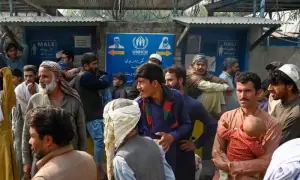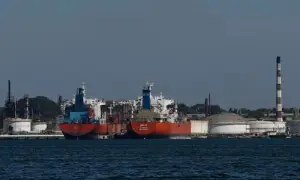Malir Expressway to destroy 21 goths
3 min readTwenty-one goths or villages that fall along the route of the Malir Expressway will be displaced in just one of a series of environmental disasters that the high-speed road will bring.
The Malir Expressway is a 39km road that is being built along the Malir river in Karachi to connect the richer neighbourhoods of DHA to new gated communities that have sprung up along the Super Highway.
The people who live in the goths where the road has been mapped have organised to challenge the government. On Wednesday, the NGO Urban Resource Centre asked members of the Indigenous Rights Alliance to explain why they do support this infrastructure expansion.
Activist Akhtar Rasool said Samo Goth and Lasi Goth are the most affected villages as they are right in the path of the expressway. Ghulam Muhammad Baloch Goth and scores of others are already being disturbed as well.
Bilawal Bhutto inaugurated the Malir Expressway in December 2020. Protests broke out immediately as the farmers and villagefolk say that they have been living there for centuries and do not want to be displaced.
They joined hands with the Indigenous Rights Alliance (that fought the acquisition of land for Bahria Town) and the Karachi Bachao Tehreek. They accused the Sindh government of building for the rich by destroying Malir’s habitat and displacing the poor who live there.
“Malir was the green belt of Karachi but because of the authorities now it is in ruins,” said activist Hafeez Baloch.
He said that the SHO of Malir is directly appointed in Chief Minister House.
“The sand used to construct the housing projects including Bahria Town and DHA City was extracted from Malir,” he said. “It disturbed the ecosystem of the area and now an expressway will worsen the situation.”
Akhtar Rasool said that MEW will affect the pollination in the area which is important for agriculture, a major source of income for the people of Malir. Not only will this be catastrophic for the environment but the road will also divide the people living on both banks of the river. “We have villages around the rivers where families move easily but because of this project it would limit people’s access,” he said. “The people of Malir do not benefit and they won’t even be allowed to use this expressway.”
According to Hafeez Baloch they are taking this case to the environmental tribunal court. “At any point in time the indigenous communities were not taken on board – even the displaced ones,” he said.
In October 2021, the Environmental Impact Assessment (EIA) was filed with the Sindh Environment Protection Agency (SEPA). The EIA is a study of the environmental impact of a development project that is carried out before the project is started. A hearing was called five months later but the indigenous people and the activists believe that it will be of no help.
For the latest news, follow us on Twitter @Aaj_Urdu. We are also on Facebook, Instagram and YouTube.
























Comments are closed on this story.